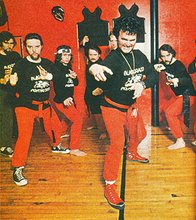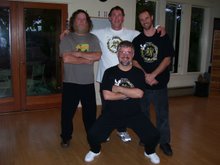
Fear not, Goody-Two-Shoes out there; this post will not send you to the street corner looking for Meth.
This is about our look at Brain activity regarding meditation, non-linear thinking and the search for higher consciousness.
From This article in the Huffington Post, Author Ryan Grim provides an adaptation of his book "This Is Your Country On Drugs: The Secret History Of Getting High In America".
Specifically, Grim details how some of the most important advances in science, medicine and technology have been influenced by the use of psychedelic drugs.
From the article, which centers around Apple computer and i-product founder Steve Jobs:
That Jobs used LSD and values the contribution it made to his thinking is far from unusual in the world of computer technology. Psychedelic drugs have influenced some of America's foremost computer scientists. The history of this connection is well documented in a number of books, the best probably being What the Dormouse Said: How the 60s Counterculture Shaped the Personal Computer, by New York Times technology reporter John Markoff.
Psychedelic drugs, Markoff argues, pushed the computer and Internet revolutions forward by showing folks that reality can be profoundly altered through unconventional, highly intuitive thinking. Douglas Engelbart is one example of a psychonaut who did just that: he helped invent the mouse. Apple's Jobs has said that Microsoft's Bill Gates, would "be a broader guy if he had dropped acid once." In a 1994 interview with Playboy, however, Gates coyly didn't deny having dosed as a young man.
(snip)
John Gilmore was the fifth employee at Sun Microsystems and registered the domain name Toad.com in 1987. A Burner and well-known psychonaut, he's certainly one of the mind-blown rich. Today a civil-liberties activist, he's perhaps best known for Gilmore's Law, his observation that "[t]he Net interprets censorship as damage and routes around it." He told me that most of his colleagues in the sixties and seventies used psychedelic drugs. "What psychedelics taught me is that life is not rational. IBM was a very rational company," he said, explaining why the corporate behemoth was overtaken by upstarts such as Apple. Mark Pesce, the coinventor of virtual reality's coding language, VRML, and a dedicated Burner, agreed that there's some relationship between chemical mind expansion and advances in computer technology: "To a man and a woman, the people behind [virtual reality] were acidheads," he said.
(snip)
And perhaps in other scientific areas, too. According to Gilmore, the maverick surfer/chemist Kary Mullis, a well-known LSD enthusiast, told him that acid helped him develop the polymerase chain reaction, a crucial breakthrough for biochemistry. The advance won him the Nobel Prize in 1993. And according to reporter Alun Reese, Francis Crick, who discovered DNA along with James Watson, told friends that he first saw the double-helix structure while tripping on LSD.
(D.R.)-- LSD Guru Timothy Leary belived this too, that psychedelics trigger changes in DNA, causing the human species to actually evolve.
Now, I'm not advocating everybody go on out and get dosed, but this is an example of our look at non-linear thinking and the possibilities in spirituality and innate knowledge that we can achieve through mind expanding experiances.
By this, I mean to include prayer, contemplation, and meditation in non-dogmatic, non-religious framework.













6 comments:
I hope you'll forgive me for splitting hairs, but I'm a resident and long-time worker in Silicon Valley and a computer scientist. Steve Jobs is a "computer guy", a great businessman, and a brilliant entrepreneur, but he is no more a computer scientist than somebody who runs a pet store is a biologist. Steve Wozniak did most of the early engineering in the garage.
Doug Englebart can be fairly called a computer scientist, and so is Gilmore. Gates is far more of a computer scientist than Jobs is, though he's really more of a computer engineer than scientist. By the way, I seriously doubt that he's dropped acid. He probably was coy because he knew what Jobs had said and was tired of looking uncool by comparison.
By the way, I credit Jobs with definite non-linear thinking. He's not a computer genius, but he is a business genius, and that's meant as a compliment.
You have more knowledge about these guys than I do.
But they are definately "Concept " guys.
There are millions of brilliant people that have never experianced psychedelics and still created cool stuff. But these guys credit their inspiration to the mind-expanding use of psychedelics. I find that fascinating...
Terence McKenna and Robert Anton Wilson had this revolutionary idea that it was psychedelics (specifically psylocybin related molecules) which ahd caused simians to "jump" conceptually to ideas, language, etc... To be totally honest, I've always thought that this is the best diea ever to explain how some old time chimp became a human, no other idea has the "explanatory power" of this one, single idea. You should read his books, "True Hallucinations" and "Food of the Gods" to get a grasp on the role of psychedelics in human history and culture.
I think the world would be a safer and funnier place if more people did more drugs.
Ooopss.... That was me, José de Freitas, using my work account. Sorry!
I've read Robert Anton Wilson's "Cosmic Trigger" and I am pretty sure I have heard Terrence McKenna interviewed on the Radio. I'll have to keep my eye out for his book, Thanks
And have a "funny" day!
Yes, all those edge theories are fun but I was here in San Francisco when the personal computer was being born. The first generation was doing lots of cocaine, the second generation switched to espresso.
Post a Comment